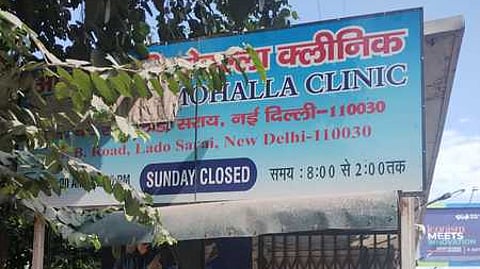

NEW DELHI: The Aam Aadmi Mohalla Clinics (AAMC), a flagship health initiative launched by the Delhi government in 2015, was envisioned as the primary healthcare access point for city residents, offering free consultations, diagnostics, and medicines. While the initiative promised to revolutionize healthcare for the city’s poorest, its current state suggests otherwise.
A visit to several clinics across Delhi reveals a range of operational challenges, including untimely closures and acute staff shortages, which have left many clinics non-functional.
In South Delhi’s Lado Sarai, a clinic has remained closed for nearly a month due to a lack of staff. “The doctor here was quite good, and I visited frequently. But since the closure, we’ve had to seek private healthcare options,” shared local resident Santosh.
In East Delhi, another clinic, despite being officially open, frequently shuts down. Locals reported that it had been closed for a week because the doctor was away. Such closures lead to an increased patient load at nearby clinics.
“Since the other clinic shut down, I now see around 100 patients during my six-hour shift,” said a Mohalla Clinic doctor. She attributed the closures to staff resignations over delayed salaries and better job prospects, adding that vacancies often take a long time to fill.
An additional concern is the suspension of laboratory tests. These tests, which were previously free for patients and conducted by private labs reimbursed by the government, have been halted.
The stoppage followed an Anti-Corruption Branch (ACB) investigation that revealed that nearly 65,000 fictitious patients were prescribed tests between February and December last year. The tests, performed by two private labs, led to ₹4.63 crore being disbursed from government funds for fraudulent services.
The ACB inquiry, initiated after a complaint from Special Secretary (Vigilance) Y.V.V.J. Rajasekhar on January 10, uncovered significant discrepancies. According to the report, 63% of patients’ contact numbers were either invalid or belonged to individuals who had never visited the clinics.
Data from one lab showed thousands of tests conducted without valid mobile numbers, and many tests linked to repeated or fabricated contact details. The Lab Management Information System (LMIS), which was controlled by private vendors, was also found to be manipulated.
This investigation came after Lieutenant-Governor V.K. Saxena called for a CBI probe into the irregularities. Meanwhile, the Delhi government has pledged strong action against any misconduct in the Mohalla Clinic scheme.